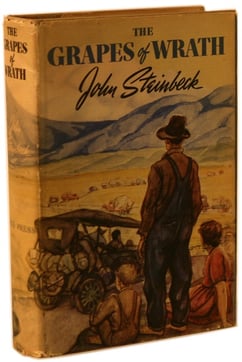Since its inception, the criteria for the Nobel Prize in Literature have always been slightly fuzzy. Some have taken Alfred Nobel’s assertion that the prize should determine "in the field of literature the most outstanding work in an ideal direction" as suggesting a kind of preference of idealism in the awarded work, and recent picks like Bob Dylan and Svetlana Alexievich have tended to bear out that reading. If one is wont to understand the award in those terms, then 1962 Nobel Laureate John Steinbeck, who would have turned 115 today, is perhaps one of the most auspicious picks of the last century. After all, the author of The Grapes of Wrath (1939) and Of Mice and Men (1937) virtually never wavered from his devotion to the idea that “In every bit of honest writing in the world … there is a base theme. Try to understand men, if you understand each other you will be kind to each other. Knowing a man well never leads to hate and nearly always leads to love.”
 Steinbeck, of course, is still widely known in literary circles for his heartfelt portraits of poor, migrant workers struggling through the Great Depression. Of his perennial preoccupation with the tragedy of the working classes, Steinbeck notes,
Steinbeck, of course, is still widely known in literary circles for his heartfelt portraits of poor, migrant workers struggling through the Great Depression. Of his perennial preoccupation with the tragedy of the working classes, Steinbeck notes,
“Boileau said that Kings, Gods and Heroes only were fit subjects for literature. The writer can only write about what he admires. Present-day kings aren't very inspiring, the gods are on a vacation and about the only heroes left are the scientists and the poor.”
If Steinbeck’s message here sounds a little like our current Pope, it’s hardly a coincidence. While calling Steinbeck an explicitly Christian writer isn’t quite accurate (though his late opus East of Eden (1952) is considered by some to be a secular retelling of the Book of Genesis), he isn’t afraid to use religious language for his own ends, from almost all of Preacher Jim Casy’s dialogue to this particularly noteworthy moment late in The Grapes of Wrath:
“Men who have created new fruits in the world cannot create a system whereby their fruits may be eaten. And the failure hangs over the State like a great sorrow. ...And in the eyes of the people there is the failure; and in the eyes of the hungry there is a growing wrath. In the souls of the people the grapes of wrath are filling and growing heavy, growing heavy for the vintage.”
 Of course, the fact that Steinbeck ranks among the most beloved American authors of all time doesn’t mean that his journey to greatness was an easy one. Just before he began work on The Grapes of Wrath, he wrote a letter to Elizabeth Otis about L'Affaire Lettuceburg, a work of satire that he would ultimately abandon. He wrote,
Of course, the fact that Steinbeck ranks among the most beloved American authors of all time doesn’t mean that his journey to greatness was an easy one. Just before he began work on The Grapes of Wrath, he wrote a letter to Elizabeth Otis about L'Affaire Lettuceburg, a work of satire that he would ultimately abandon. He wrote,
“You see this book is finished and it is a bad book and I must get rid of it. It can't be printed. It is bad because it isn't honest. Oh! the incidents all happened but — I'm not telling as much of the truth about them as I know… My whole work drive has been aimed at making people understand each other and then I deliberately write this book, the aim of which is to cause hatred through partial understanding. My father would have called it a smart-alec book. It was full of tricks to make people ridiculous. If I can't do better I have slipped badly. And that I won't admit—yet.”
Once he had thrown away his book and picked up The Grapes of Wrath instead, he was noticeably relieved. He said,
“It is a nice thing to be working and believing in my work again. I hope I can keep the drive. I only feel whole and well when it is this way.”
After all, by Steinbeck’s own reckoning,
“The writer must believe that what he is doing is the most important thing in the world. And he must hold to this illusion even when he knows it is not true.”
While this notion, like so much of what Steinbeck says, seems like it’s aimed at would-be writers, it really ought to speak to all of us as readers. For instance, when he says, “The discipline of the written word punishes both stupidity and dishonesty,” he offers a warning to writers who might drift into dishonesty, but he also unearths a universal truth that speaks to how we feel when we read. After all, perhaps more than any other Nobel laureate of such high profile, Steinbeck was a writer who seemed to believe that literature was something that we did together as a community. Or, to put it another way,
“We are lonesome animals. We spend all our life trying to be less lonesome. One of our ancient methods is to tell a story begging the listener to say—and to feel—“Yes, that’s the way it is, or at least that’s the way I feel it. You’re not as alone as you thought.””









